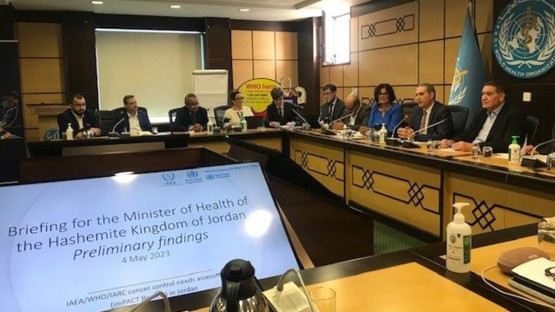The Government of Jordan has expressed its commitment to address the growing cancer burden in the country and plans to launch its first National Cancer Control Plan (NCCP) with a related Action Plan for the period 2023-2030. These key documents will be developed based on the findings of an imPACT Review Mission conducted in Jordan from 30 April to 5 May by an international team of cancer experts from the IAEA, the World Health Organization (WHO) and the International Agency for Research on Cancer (IARC).
“Cancer is a growing burden in Jordan, and the government recognizes how important it is to strengthen cancer control at every level,” said Professor Feras Hawari, Jordan’s Minister of Health. “The Ministry requested the IAEA and its partners to conduct an imPACT Review Mission in order to understand progress and gaps since the 2012 imPACT Review and to ensure strategic advances across the cancer control spectrum of interventions,” Hawari said.
Jordan had 11,559 new cancer cases in 2020 and 6,190 cancer deaths, according to IARC’s GLOBOCAN estimates. In line with global trends, the burden is expected to increase, with 21,509 new cases predicted annually by the year 2040 according to IARC.
The experts participating in an imPACT Review Mission conduct a comprehensive situational analysis of cancer control in a country and provide prioritized phased recommendations for follow up actions at the national level. After months of virtual preparation and engagement with the Ministry of Health and other stakeholders, the team of 18 international experts travelled to the capital Amman, and the towns of Irbid and Zarqa to visit and observe primary care and tertiary level facilities, engaging with a broad number of stakeholders and participating in strategic planning for better cancer control in Jordan.
“The imPACT assessment yielded concrete technical recommendations for Jordan, including, in alignment with the IAEA’s Rays of Hope initiative, suggestions for improvements in multimodality medical imaging and radiation therapy. These are highly relevant measures that will most benefit the cancer patient population of Jordan,” said Miriam Mikhail Lette, Radiologist at the IAEA Division of Human Health.
Rays of Hope is a flagship IAEA initiative to increase access to radiotherapy in countries where radiotherapy is unavailable or insufficient to meet demand.
“IARC's role in evaluating cancer prevention and early detection is essential to ensure that effective evidence-based strategies are in place to support the NCCP and reduce the burden of cancer in the country,” said Andre Carvalho, Scientist at IARC’s Early Detection Prevention and Infections Section.
The mission visited the Al Basheer Hospital public hospital complex and the King Hussein Cancer Centre (KHCC), which has been designated an IAEA Collaborating Centre for Cancer Initiatives, as well as the Royal Medical Services and University Hospitals. KHCC has indicated a strong interest in participating in the IAEA’s Rays of Hope initiative as an anchor centre for the region.





